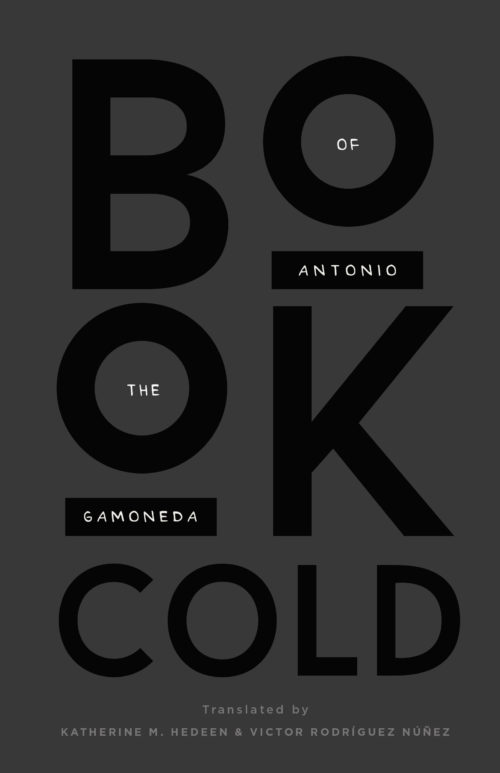Faked a face in the air (hunger and marble of Andalusian hospitals), at the far end of silence to hear the handbell of the dying. He would look at us and we would feel the bareness of existence. Quickly opening all the doors and spilling the wine on the daybreak ice. Later on to show us the empty bottles as he sobbed. Each morning he placed steel and tears in the brooks and taught the birds to sing the ire song: the clear brook for the sweetly imbecilic daughter; the blue water for the hopeless woman, smelling of vertigo and light, lonely in the sump amid white flags, cold below the serge, and the eyelids now yellow with love. Constant in the empty passion. The dogs sniffed his purity and his hands cankered by the acids. At dawn, hidden amid the white stockades, near death before the highways, he’d see the shadows move into the snow, the mist boil in the deep city. Shadows coming, damp animals breathing close to his face. He saw the fat glow in the lavender and the sweetness black in the earth cellars.It was the feast: light and saffron in the white kitchens; distant, beneath dusty garlands, faces in the carbide sadnessand his howling amid the music’s remains.
Snowkeeper (excerpt)
Feature Date
- July 20, 2022
Series
- Translation
Selected By
Share This Poem
Print This Poem
“Excerpt” from BOOK OF COLD: by Antonio Gamoneda.
Published by World Poetry Books on May 10, 2022.
English copyright © 2022 by Katherine M. Hedeen and Víctor Rodríguez Núñez.
All rights reserved.
Reproduced by Poetry Daily with permission.

Antonio Gamoneda was born in Oviedo, Asturias, Spain in 1931. One year later, his father died suddenly and Gamoneda moved to León with his mother. He left school before he could finish, taking a job as a messenger boy at a bank to help the family, and continued to work there in different capacities over the next 24 years. His first book was published in 1960 (shortlisted for the Adonais Prize) and then there was silence for the next 17 years. Self-taught and prolific, Gamoneda was also fiercely opposed to the dictatorship of Francisco Franco, in power from 1939 to 1975, and deeply involved in the resistance movement. He did not bring out another book until 1977. His work only began to receive the attention it deserved after 1985, when he was awarded two prominent prizes (the Castilla y León Poetry Prize in 1985 and the National Poetry Prize in 1987). An extraordinarily unique voice in post-Civil War Spanish poetry, in 2006, Gamoneda received the two highest honors a writer can receive in the Spanish-speaking world, the Reina Sofía Poetry Prize and the Cervantes Prize, one of the few to receive both in the same year. He continues to be a vital and powerful poetic presence in Spain and throughout the world.

Katherine M. Hedeen’s latest translations include Almost Obscene by Raúl Gómez Jattin (CSU Poetry Center) and from a red barn by Víctor Rodríguez Núñez (co•im•press). She is a Professor of Spanish at Kenyon College and a Managing Editor of Action Books. More info:www.katherinemhedeen.com
Víctor Rodríguez Núñez (Havana, 1955) is one of Cuba’s most outstanding and celebrated contemporary writers, with over seventy collections of his poetry published throughout the world. He has been the recipient of major awards in the Spanish-speaking region. His selected poems have been translated into over a dozen languages. His latest book in English translation is from a red barn (co•im•press, 2020). He divides his time between Gambier, Ohio, where he is Professor of Spanish at Kenyon College, and Havana, Cuba. More info:www.victorrodrigueznunez.com
"When a younger generation of Spanish poets began to awaken and stretch their creative limbs at the dawn of a post-Franco era, what they found, intensified by decades of resistance and years of silence, was the beacon of Antonio Gamoneda’s mature poetry. His evocative sensual palette—the scent, feel, taste, and sound of conflicted experience, a lurching between the repellent and the irresistible—is virtually without comparison. But the real miracle of his work is how he combines that flashy richness with such syntactical concision, and with a folkloric strangeness peculiar to his work alone. The extraordinary translation by Katherine Hedeen and Victor Rodríguez Núñez maintains the compression of the Spanish by often allowing the agency carried by a Spanish verb to be absorbed completely into the English verb. So, for example, 'Fingía un rostro' becomes 'Faked a face.' And so in English, as in Spanish, the verb, not the subject, controls the sentence."
—Forrest Gander
"Antonio Gamoneda’s Book of Cold, a long poem in the modernist tradition, is an undisputed masterpiece by Spain’s greatest living poet. In this sensitive and alert translation, Hedeen and Núñez have captured the epic sweep of Gamoneda’s distinctive cadences, halfway between prose and verse. This translation, long overdue, will reveal the full extent of Gamoneda’s genius to English-speaking readers."
—Jonathan Mayhew
Poetry Daily Depends on You
With your support, we make reading the best contemporary poetry a treasured daily experience. Consider a contribution today.




